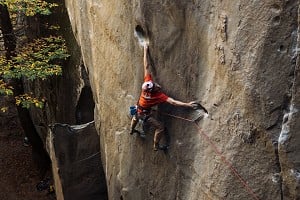
Caroline Ciavaldini...Those in the loop of the competition scene a few years back would no doubt have heard this name - former World Youth Climbing Champion, winner of a Lead World Cup stage and all-round competition star. For those not so competitively inclined, add to this already impressive resume a list of hard sport ascents up to 8c+ and trad routes up to E9 and a strong, determined young French woman named Caroline Ciavaldini may come to mind. Despite her competitive roots, 29 year-old 'Caro' has been making rapid progress in traditional climbing in the UK, having spent considerable time here after meeting and eventually marrying husband James Pearson last year.
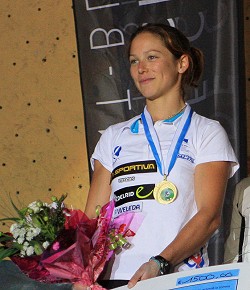
It's a rare treat to receive foreign climbers who wish to sample trad climbing, and rarer still to discover an individual who actively embraces the discipline, taking the time to understand the complexities of its ethics and simultaneously having the courage and self-confidence to interpret them in their own way - sifting out the nonsense, exploring the boundaries and above all: weathering the (very British) metaphorical storm that trad ethics can bring us into.
However, as self-assured and confident as Caro may be about her climbing and her opinions on trad, the dizzy heights she has reached in the sport contrast greatly from her nature - very much down-to-earth with a good measure of fun and laughter.
So how does a world-class foreign climber perceive UK trad climbing? Caro's curiosity about the British climbing scene and her bemusement at our traditions offer a refreshing perspective on British climbing. I asked her some questions which gave an interesting portrait of the UK climbing scene viewed from the outside...
What is your background in climbing – what attracted you to the sport?
I grew up on a small island in the middle of the Indian Ocean, La Reunion. It is French, and for some reason, climbing on La Reunion is very popular as a school sport. Pretty much every kid has a semester of climbing, just like football, rugby, gymnastics… I started on a small wall on the side of the school building, and realised quite fast that I liked it, and that I was good at it. From that moment on, climbing took a bigger and bigger place in my life. I was immediately introduced to competitions, as it is the way people climb over there. I realise now how lucky I was to bump into climbing that easily… it doesn't happen like that in the UK does it?
Before coming to the UK what was your impression of the climbing culture over here?
I will be very honest, I didn't have any impression at all about the UK climbing scene. I was a comp climber from 16 till 26, and a pretty focussed one. I believed that comp climbers were the best climbers in the world, and that the other ones (the outdoor ones) were climbers who had tried competitions and failed. I have now realised that comp climbers are the best… at what they do. I was still climbing outdoors a lot though.
There weren't any very strong UK female lead climbers in the world cups, maybe I knew Gaz (Parry) a tiny bit… but that was all. So I didn't have any interest in UK climbing. I had never heard of Trad climbing, and I didn't even know who Ben Moon was, even if I had a few Moon clothes!
Now you've spent time here with James, how has that impression changed (if at all!)
For a start I have discovered Trad climbing. I sometimes think that it is a different sport than sport climbing. I have met a few UK climbers, not that many though… Hazel, Dave MacLeod, Ben Moon, Gaz Parry, … I think each of these guys present a slightly different facet of the UK scene and it seems to me that the reasons why someone starts climbing in the UK are quite different from in France. You just have to look at the music habits of the French climbers, more reggae, and in the UK, more electro…the people who choose to start climbing are not the same in France and in the UK, simply because French climbing (mainly sport), isn't about risk taking, while UK climbing (more trad), is definitely about risk taking. I would maybe not have started climbing at 11 if I had lived in the UK: for a start, my parents wouldn't have let me, and moreover, I don't think I was searching for risk, although I have no idea what I was looking for! And maybe even James, crazy kid as he was, wouldn't have been that keen on climbing if it had been like it is in France, only about the effort, no danger!
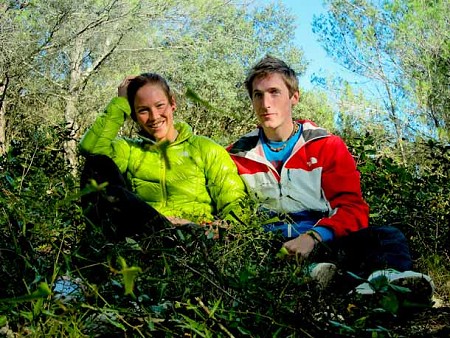
What do you think about UK climbing and its ethics? How do they differ to French sport ethics?
French sport ethics are quite simple really: don't step on the bolts, climb in one go to succeed on a route. It takes maybe 5 minutes to explain what the rule is, whereas I am still trying to understand the rules of trad: ground up, abseil inspection, preplaced gear or not, pegs… to be honest I don't really understand the grades in Trad, and the way uk climbers play the "downgrading game" makes me laugh a lot!
I just did "Requiem", and I tried to go ground up, but then I am not very sure at all what ground up means. What I did was to start from the bottom. When I fell, I didn't lower to the ground, I finished the route, and it took me a lot of time, falling, trying again… James told me I couldn't lower from the top afterwards to improve my method on the crux, otherwise I wouldn't be ground up anymore. In fact even James wasn't really sure what ground up was precisely. I asked other climbers afterwards and received different definitions each time!
The reason why I tried Requiem without lowering into it is that I had already done two E8s in the weeks before, working them on an abseil rope, and I wanted to spice up the game. I had my fill of extra-spice: Requiem took me seven tries, which is more attempts than I have ever done on a sport route! I loved my little game.
Anyway… more big question marks I have: sometimes it seems like it's ok to climb on preplaced gear for some people, James personally doesn't consider it and he doesn't encourage me to do it now that I am capable of placing gear.
Or the peg situation… or the threads in Pembroke… placing new pegs on sea cliffs when you know they will rot within one year…
You guys play a funny game. What is ethically correct in the UK? I feel like the answer will change with every climber. Maybe it will even change one day to the other. I sometimes think that you do it on purpose to be able to have endless arguments on the UKC forums … which are the most hilarious comments I have ever seen!
Don't take me wrong, I am no one to criticize, all this just makes me laugh - I don't take it very seriously.
How is the UK climbing scene perceived generally in France?
I don't really know… I don't think many French climbers understand trad at all, we have routes on gear, but only multipitch, nothing as crazy as British trad! If people want to take some risks, they go mountaineering. I don't think French people understand the complexity of the UK climbing scene really.
You have managed to convert your sport climbing talent to trad very quickly and impressively – did you find it easy to make this transition?
From the outside, you could believe that it happened in a heart beat. But it didn't: ok, Point Blank was my second ever trad route, but then Point Blank has a lot of threads, the gear is very easy. Doing Point Blank didn't make me a trad climber. And I still really struggle to judge small nuts. James always tells me: "you must be able to say, on a scale from 1 to 10, how good your gear is". I still don't succeed in doing that.
Most of all, I had a very good master Jedi with James. He started slowly, sending me on sport routes where I alternately placed gear and clipped bolts. Then he spent a lot of time seconding me and explaining to me which gear was good, which wasn't. At first, I wasn't ok with taking any risk. Twisting an ankle wasn't acceptable risk. But it is not black or white… Little by little, I have changed my philosophy. Like Hazel would say, I am learning braveness. Trying not to mistake it for stupidity. And I have the huge advantage of a very very good teacher.
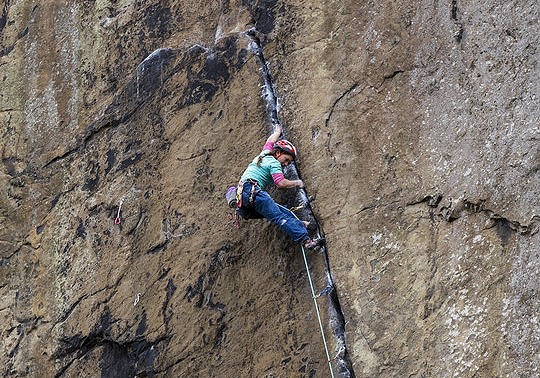
What were the difficulties you had to overcome?
I had to learn to deal with a new kind of stress: the fear of hurting youself. This isn't at all part of the game in sport climbing.
In the end, I have realised that the best way to not get hurt, is to climb very well when it is dangerous. Which means to be able to control your stress… and for that, I reuse techniques that I developed in competitions to handle the fear of failure: I focus on the climbing, the movements. Yuji (Hiriyama) put this into words recently: he told me that trad lies in the moment where you decide if you will commit to climbing a route or not. That is the moment when you have to choose to accept the risk. Once you are in the route, being scared is pointless; it doesn't help you climb better. So get rid of the fear.
Of course I am only talking about routes after work. When onsighting I think you have to listen to the fear and decide to stop and back down if you are about to take too much risk.
Recently the level of elite female climbing in the UK has gone up dramatically and we have events such as the Women's Climbing Symposium bringing more female climbers of all levels together. What role does gender play in the French climbing scene?
I don't think the gender thing is such an important topic in France, or at least I don't feel weaker, or deprived, or anything like that, even if in France too, you will find an idiot willing to downgrade as soon as a girl does a route. But for a start there are way more women climbing, sport climbing of course. Maybe you could find a similar situation with the mountaineering scene, especially in Chamonix. I have a good friend who is a girl AND a mountain guide, Marion Pointevin, and she is quite badass. But I think just like me she is quite proud and happy to be a woman in a micro world where men are in the majority - we are a rare product!
How has James influenced your climbing?
Without James I would have never discovered Trad. I would certainly be back to a normal job, climbing on weekends. Instead, he has shown me the way to be a professional climber. If I wanted to be dramatic, but I am not, I would say that he has changed my life (wow!). But I won't say any of that, other wise with all the fuss already on about Rhapsody and Something's Burning, he'll turn into an idiot with a big head!
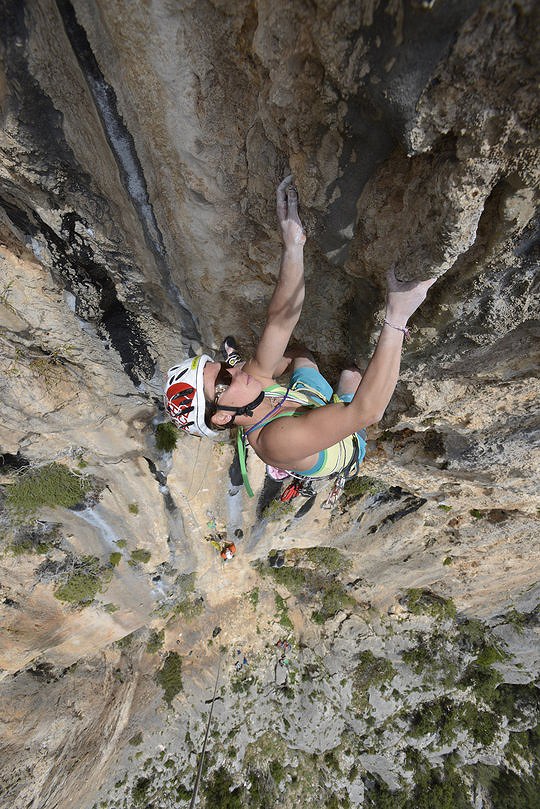
How does your approach to a hard trad project differ from that of a sport project?
The hardest route I have done in trad is Chupacabra. I have done Chicama too, but I found Chupacabra much harder. So, you could consider that it was a trad project. It took me something like 5 days, between working the methods over several days, getting shut down, a first try where I took a whipper from the top, and the final go.
So how did that differ from, let's say an 8c? I had to have a few discussions with my head to finally grow the guts to try and lead it. I fell, and I had to take a day off to mentally recover. In the end, trad leaves me much bigger memories than sport climbing. It is an adventure, a personal exploration of my own mind. But there is a little bit of that in a sport route, where you have to find in yourself ways to climb better - not as much though.
Can you see yourself ever returning to the competition scene?
No. I loved competition, it taught me everything, especially to give yourself a goal, plan it, and work until you reach it. But my comp days are over. I am in my second climbing life now.
What is your favourite UK climbing area?
I love the variety of the slate, Pembroke, even the crazily slippery Dumbarton, the friction of the peak district. I love how varied your cliffs are. I wouldn't be able to pick the one I prefer, what I like is the variation. But I can tell you one crag I don't like: Raven Tor. Sorry, but I have bigger and better dreams of limestone…



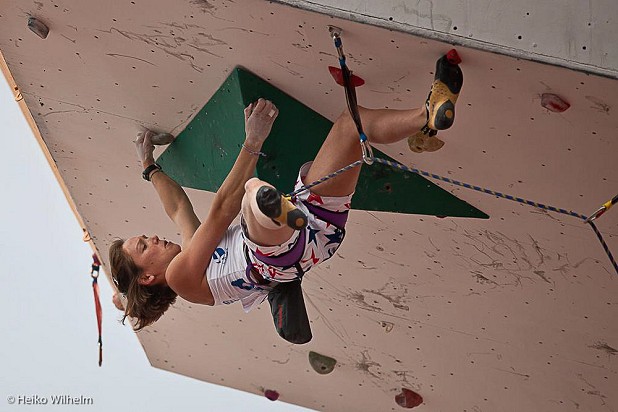

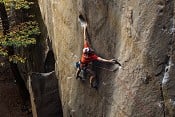
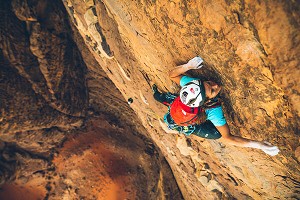
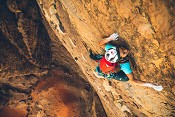
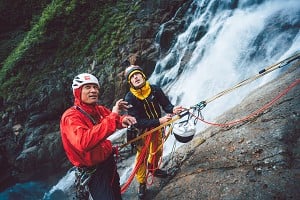
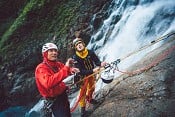









Comments